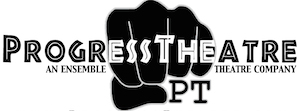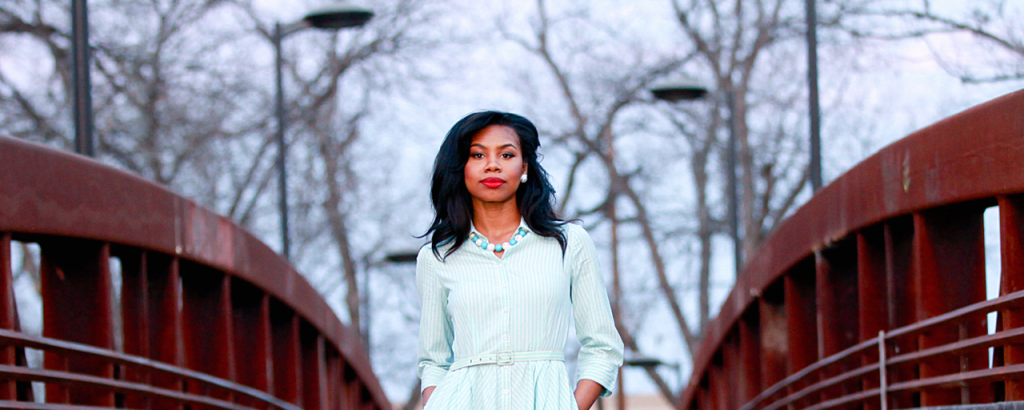For each tour city where Progress Theatre travels to perform, one of our ensemble members uses this blog to reflect on new insights, discoveries, questions and conversations we encounter as we engage with audiences and communities across the country. We share this “Ensemble Blog” as another way of following the tour, continuing the post-show dialogues often started with our audiences, and mapping our journeys “in progress”–literally and figuratively.
As a student who’s studying to become an actor, you wonder how people can tour the same show for a year or more and never tire of the experience. How they can say the same lines, make the same choices, all the while producing the same product night after night. I thought that at some point they would be bored with telling the same story, and engaging with the same characters. Well, this may be some actor’s experience, however, it is something that I don’t believe could ever exist in Progress Theatre.
Although Dallas was only our third touring city, I’ve spent a year with the company work shopping the piece and it has been an experience of illuminating longevity. As a former student of Dr. Cristal Channel Truscott at Prairie View A&M University, I received a call from her to join the ensemble in The Burnin’ while in my first year of graduate school at Southern Methodist University, and without hesitancy, accepted what has now been a year and a half of enlightenment, purpose, exploration, education, self-evaluation, acclimation, and the list goes on and on. The piece allows for extensive exploration because it carries such density, dimensionality and relevancy that new performance spaces, new audiences, and current events offer a call to which we must consistently respond. Logistically, new performance spaces may cause some of the blocking to change; but the change is motivated by the how the space is asking us to tell the story as well as the challenge of maximizing the intimacy of the space. Audiences are pulled into that call as well. We never know if they will lean in, or sit back; but nevertheless it is all a call that we must respond to.
Another thing that I love about touring with PT is what we call our shared talkback space. After the show we take time to talk with the audience about the experience we all just shared and its always refreshing to hear their thoughts, impressions, and revelations. In the Dallas talkback, a gentleman talked about seeing Boo, the contemporary character that I play, who struggles in an abusive relationship, with self-respect, self-worth, and self-love, within his own family and the difficulty of rehabilitating that state of mind. Another audience member talked about her compassion for MayBee, a character in the 1940’s time period that I play. She is the descendent of a line of comfort girls who is determined to escape the oppression of the antebellum south and make a plan for the future. The audience member talked about the absence of control and ownership over women’s bodies in that time period and how MayBee is a victim of her family lineage. I see these two comments as a conversation between the past and present and another dimension to explore within the piece.
I love the parallel of the stories of these two women because of the light it sheds on the history of objectification of women’s bodies and how it has inherently affected the present day ideas of self love, self gratification, beauty, and self identity. I love plays that travel through time exploring cause and effect to give context to the present day societal behavior that we are so quick to judge and slow to empathize with. When we see tragic events like the Trayvon Martin case, the Michael Brown case, the Eric Garner case and all of the young men who have been victims of police brutality but painted as aggressors, agitators, or thugs who have no respect for authority, it is easy to assume that these young men were problems in this community instead of products of an environment in which they have been consistently labeled as a threat. Society has developed this perspective by the portrayals of Black males in the media that perpetuate stereotypes that stem from a history of oppression and dehumanization. These implicit biases often exist in the mind without prior knowledge or acknowledgement of historical influences. In the words of Broadcast, the reporter and activist in Da Spot, people want to “believe that the inequalities of the present are immune from systems inherited from the past.” This is one of my favorite lines from the show because it highlights the significance of the transportation through time from the past to the present. The past gives clarity and insight and always puts the present and future into context. Likewise, MayBee’s lineage gives context to Boo’s present day struggle with self worth, but also the misrepresented images of black women in the media.
The great thing about Cristal Channel Truscott’s work is that it breaks down those stereotypes in order to examine the person and their environment at it’s core so that you will not only see and understand the bigger picture and how it relates to today but also empathize, see yourself within that picture, how it affects you, and prompts you to move to action. There is a constant call and response between past and present and we can only understand the present by exploring the past. For many of us it is the denial or ignorance of shared American history that prevents us from the truth that is the past. Without examining and understanding the choices made by our ancestors, the progress of the future is in jeopardy. When we remember that we are all descendants of slavery we can come to a common ground and have the conversations that lead to healing. Thank you, Dallas audience members for being a part of this new layer of examination within this touring experience. I am forever grateful for this opportunity of exploration of the The Burnin’, of the past and present, and of call and response. In the words of the character, Royal, “ Off we go. Off we grow…”

